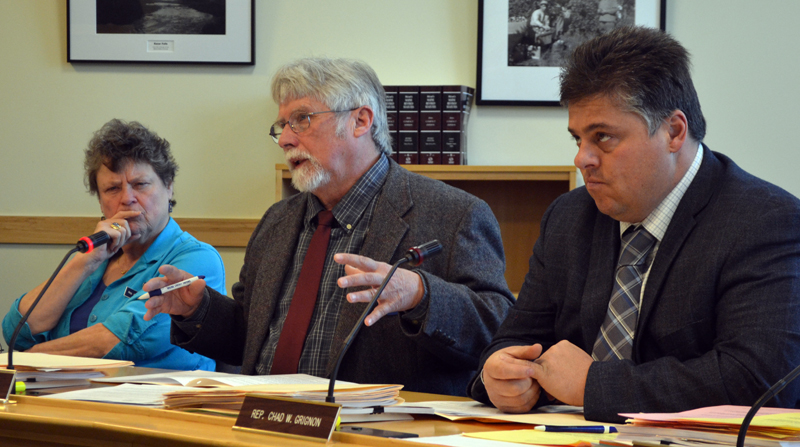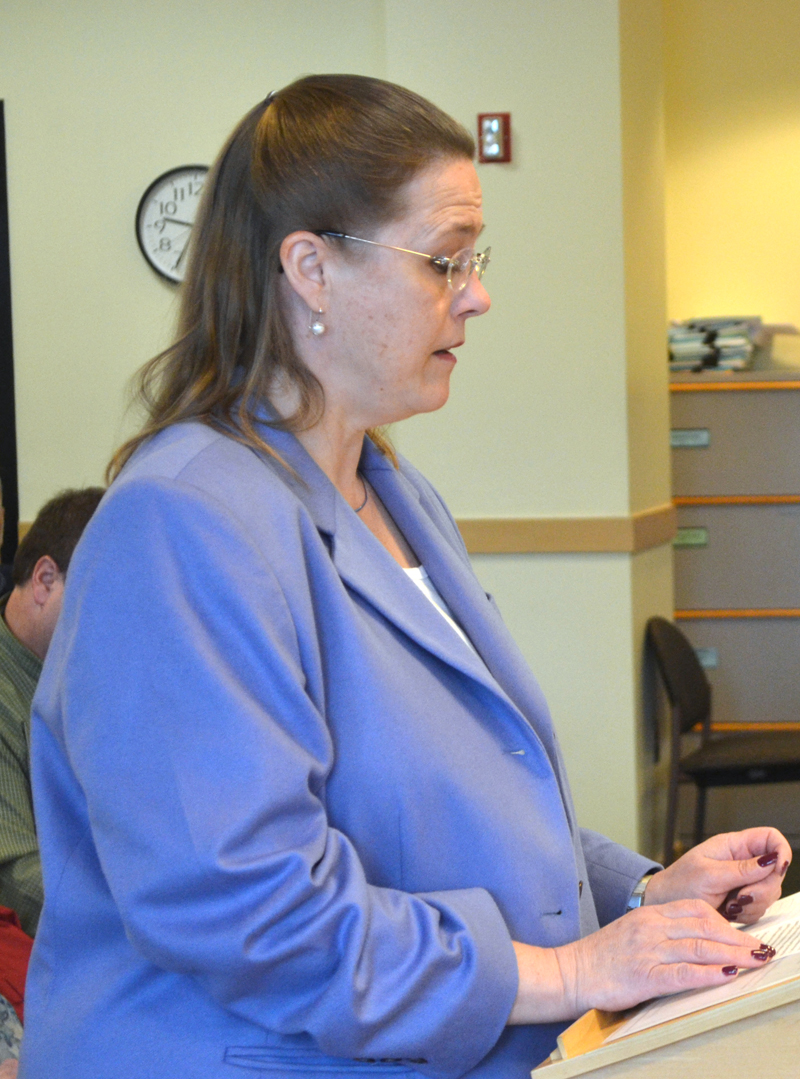
State Rep. John Spear, D-South Thomaston, asks a question during a public hearing on L.D. 972 before the State and Local Government Committee on Wednesday, March 29. Spear is flanked by Rep. Pinny Beebe-Center, D-Rockland, and Rep. Chad Grignon, R-Athens. (Maia Zewert photo)
Lincoln County officials and residents traveled to Augusta the morning of Wednesday, March 29 to testify before the Committee on State and Local Government about a bill that would shift the final authority over the county’s budget to the county budget advisory committee.
State Rep. Stephanie Hawke, R-Boothbay Harbor, is the sponsor of L.D. 972, “An Act to Modify the Lincoln County Budget Advisory Committee,” which proposes changes to the county budget process.
The Lincoln County Board of Commissioners would only be able to revise the budget adopted by the Lincoln County Budget Advisory Committee with a unanimous vote. The budget advisory committee could then reject the commissioners’ changes with a two-thirds vote of the members present.
Currently, the commissioners can amend the budget recommended by the budget advisory committee. The revised budget does not go back to the budget advisory committee.
The bill also proposes to increase the number of municipal representatives to the committee from nine to 19, which would give each town the option to appoint one municipal officer to the committee for a one-year term. A member of the county’s legislative delegation would continue to sit on the committee.
Co-sponsors of the bill include most of the county’s legislative delegation: Sen. Dana Dow, R-Waldoboro; Rep. Dick Bradstreet, R-Vassalboro; Rep. Mick Devin, D-Newcastle; Rep. Jeff Hanley, R-Pittston; Rep. Jeff Pierce, R-Dresden; Rep. Deb Sanderson, R-Chelsea, and Rep. Abden Simmons, R-Waldoboro.
During the public hearing, supporters of the bill testified that the changes would give more voice and control to the towns, which are required to pay county taxes. All three county commissioners, Lincoln County Sheriff Todd Brackett, and Lincoln County Administrator Carrie Kipfer testified against the bill.
South Bristol Selectman and former state Rep. Chester Rice, who helped craft the bill’s language, said all towns in the county should have the option to have a seat at county budget hearings.

South Bristol Selectman Chester Rice testifies in favor of L.D. 972. (Maia Zewert photo)
“My town pays $800,000-plus in county taxes, but I am denied a seat under present rules,” Rice said. “Five towns in my coastal area pay close to half the total county tax, but have just one person on the committee.”
Also speaking in support of the bill was Wiscasset Selectman Ben Rines. Rines, a former state representative who served on the Committee on State and Local Government, echoed Rice’s statement.
“For the town of Wiscasset, this year our tax bill will be approximately $580,000, and we ought to have more say in it than we do,” Rines said. “There are just no checks and balances.”
When Wiscasset residents consider the municipal budget, they are presented with both the selectmen and budget committee’s recommendations and have the final decision. The commissioners don’t have that kind of “check” on their authority, Rines said.
“The committee is advisory and it’s an absolute joke,” Rines said. “It’s fun to go and learn about the budget, it’s a nice social evening, but that’s the extent of it. You leave, and the commissioners do what the commissioners want to do.”
The bill would give the control over the county budget to the people who pay the bills and would increase the transparency of county government, according to Boothbay Selectman Chuck Cunningham.
Under the current system, the commissioners can choose to ignore the recommendations of the budget advisory committee with no recourse, Cunningham said.
“The committee currently has no authority. This has led to frustrations of past committee members, myself included, when the committee has voted to cut a proposed budget only to see it returned to its original proposed level with no further input from the committee,” Cunningham said.
Giving each town the chance to have a seat at the table would help alleviate taxpayer frustrations, Cunningham said. The county tax bill and the education bill are two of the largest bills a town has to pay, but the people have more control over education spending, Cunningham said.
Newcastle resident Jonathan Hull also spoke in favor of the legislation, saying it would create “an effective and responsible check and balance” on the commissioners’ authority.
The existing checks on the commissioners’ authority are “virtually toothless,” Hull said.
Due to the budget advisory committee’s lack of “real authority,” there is little incentive to thoroughly examine the details of the county budget, Hull said.
The committee also received a letter in support of the bill from the Southport Board of Selectmen and written testimony from Edward Dardis, a Damariscotta-based attorney.
“As presently structured, this is the classic case of taxation without representation,” Dardis wrote in his letter of support.
The commissioners and the county’s department heads are always aware that every dollar the county spends comes directly or indirectly from county taxpayers, Kipfer said. During the budget process, “the known constraint is to keep spending as flat as possible,” she said.
In the past decade, county expenditures have increased from $9.6 million to $10.9 million, an average increase of $130,000 or 1.5 percent per year, Kipfer said.
The budget advisory committee is included in decision-making and is valued for the insight it provides, Kipfer said. After the budget advisory committee “made it very clear” that the county was spending too much on health insurance, the county selected a different plan, saving more than $150,000 per year. In addition, the county now requires employees to contribute more toward their premiums.
The county also declined to offer dispatching services to a community outside Lincoln County, as it would have forced the communications center to hire more staff without recouping the cost.
All changes that affect the budget take hours of research to reach the right conclusion, Kipfer said. While the budget advisory committee is made up of knowledgeable people, their expertise is with town government, and not necessarily the functions of county government.
“Just as I would not have the experience to make decisions on a school budget, I don’t expect them to know what it takes to develop the sheriff’s budget start to finish,” Kipfer said.

Lincoln County Administrator Carrie Kipfer speaks against L.D. 972. (Maia Zewert photo)
Brackett voiced concern that the bill could unintentionally limit his ability to meet the county’s public safety needs.
“It seems impractical to shift the primary responsibility for establishing the county budget, including the public safety portion, to a committee who will meet only a few hours per year and bears no responsibility for, nor shares in the liability of, its outcomes,” Brackett said.
Lincoln County Commissioners Bill Blodgett, Hamilton Meserve, and Mary Trescot all spoke against the bill.
Blodgett and Trescott said a one-year term would not provide members of the budget advisory committee enough time to develop an adequate understanding of the county budget in order to participate in a knowledgeable manner.
In addition, it would be irresponsible to shift the responsibility of compiling and approving the budget to a committee when the commissioners are responsible for the county’s safety and well-being year-round, Meserve said.
Former Wiscasset Selectman Edward Polewarczyk also voiced concerns about the budget advisory committee’s “incomplete understanding” of the county budget. Polewarczyk chaired the committee for three years.
During his time on the committee, Polewarczyk found he needed to attend the commissioners’ meetings in order to better understand the issues facing the county.
The bill also received opposition from Bremen Selectman and former state Rep. Wendy Pieh, who referred to the bill as “a solution looking for a problem.”
The state could help alleviate the tax burden on the towns by increasing the county’s revenue, Pieh said. She suggested that the state could increase its reimbursement to Two Bridges Regional Jail in Wiscasset for housing state prisoners.
The Committee on State and Local Government also received comments from individuals neither for nor against the bill.
Newcastle Town Administrator Jon Duke said the Newcastle Board of Selectmen supports the idea of having more accountability during the county budget process, but disagreed with both the one-year term of the committee members and the number of members that could potentially be on the committee.
Devin said he co-sponsored the bill to ensure a conversation between people on both sides of the issue happened. If the bill were to move forward, however, it would require major changes, including the establishment of a quorum for the committee.
In addition, the bill would have to provide some flexibility for the county to react to an event the budget advisory committee might not have foreseen, Devin said.
“You cannot separate responsibility and authority so far apart and expect the system to work,” Devin said.
The Committee on State and Local Government scheduled a work session for L.D. 972 for Wednesday, April 5 at 11 a.m.



